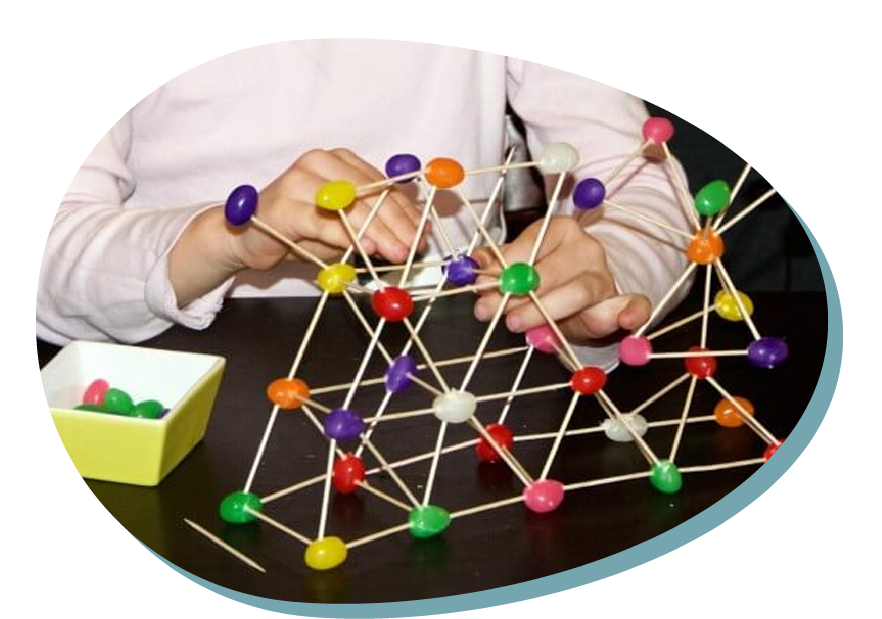Building structures with jelly beans
Type of resource: website, guidelines, game
Web address https://thestemlaboratory.com/stem-jellybean-structures/
Language: English
Description
Experiment building structures with jelly beans and toothpicks. It can be either a free or guided activity. The challenge is to create stable structures which do not fall apart.
Scientific concept introduced
Three-dimensional space, geometrical figures, spatial stability
Creative and critical thinking
To take initiative
To create structures.
To explore which structures they can build.
Mathematical reasoning
To develop the three-dimensional vision, to understand the concepts of geometry and space, to recognize and differentiate the geometric figures.
Scientific thinking
To develop the ability to observe and discover.
To interpret.
Make anticipations and comparisons of the result of the experiment.
Elaborate explanations.
Drawing conclusions.
Testing a hypothesis.
Learning how to learn
Feeling self-efficacy in learning. Self-regulated learning.
Additional
Fine motor skills, hand-eye coordination, and precise movement.
Vocabulary.
To take common decisions. Sharing ideas, accepting management.
Building structures with jelly beans
Overall aims
– To develop the ability to observe and discover
– To make anticipations and comparisons
– To testing a hypothesis
– To drawing conclusions
Vocabulary – keywords should be understood
Three-dimensional space, geometrical figures, spatial stability
Expected learning outcomes (operational aims)
– To develop the three-dimensional vision
– To understand the concepts of geometry and space
– To recognize and differentiate the geometric figures
– To know what a side, a vertex or a face of a figure is
STEM skills – to which the learning unit is related to
CORE STEM SKILLS
– To take initiative
– To create structures
– To be creative
– To explore the elements and properties of the structures created
Teaching methodologies/activity outline
Experiment building structures with jellybeans and toothpicks. It can be either a free or guided activity. The challenge is to create stable structures which do not fall apart.
1- Lest go to see what we need to start the experiment:
Give them the following elements: jellybeans and toothpicks.
2- Prepare and develop the activity:
Children can build their own structures, from the simplest, to constructions as complex as they can think of. Let children to be as creative as they want to be.
3- Results of the activity:
Children will have built cubes, pyramids, towers … they can try to count sides and vertices as well as check the strength, elasticity and other properties of structures by stacking books or other objects on top of them.
4- Conclusion:
Kids can learn about geometric figures, three-dimensional structures, spatial stability, resistance of structures and materials, etc.
Assessment of learning
Initial evaluation
– Get to know the previous knowledge about geometric structures, three-dimensional constructions and spatial stability
Continued evaluation
– Listen, think, create and elaborate explanations of the activity procedures.
– Observe and explore the options of building that they have, with an attitude of curiosity.
– Use the oral language and gesture to express ideas and feelings.
Final evaluation
– To evaluate the learning objectives.
Equipment and materials to be used in learning unit (tools, ingredients etc)
Tools: toothpicks
Ingredients: jellybeans
Kind of setting
Preschool room
References – source
Building structures with jelly beans
1. Usefulness for STEM education – integrating content of different disciplines
Cross-curricular character of the resource

The range of S-T-E-M subjects included

The presentation of possibilities of including artistic activities (STEAM approach)

2. Expected learning outcomes
Consistency (links) with preschool core curriculum

Communicativeness of description

3. Methodology of teaching
Clarity, communicativeness of instructions for teachers

Meaningful learning – using practical life problems

Original idea

The level of ease in implementing the methodology to preschool age children

The level of ease in preparing necessary ingredients, materials and equipment needed

4. Sustainability
Ecological characteristics of materials/ results

Supporting healthy eating habits

Relation with local traditions of cooking (using local products)

Low ecological footprint

Possibilities of inclusion (respecting cultural diversity and food intolerances)

5. Class management
Using differentiated forms of work – individual, team work etc.

Individual work

Team work

Whole group
6. Time management

Short activity (10-15 minutes)

Medium activity (20-30 minutes)

Long activity (1 hour or more)

Very long activity (1 day or more)
PDF: https://www.printfriendly.com/p/g/CUH7MF

